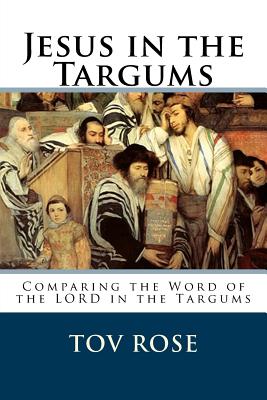Jesus in the Targums

Jesus in the Targums
Question: Why is it important for Jewish and Christian people to use this book? Answer: Because it gives us an insider's view of how 1st Century Jewish people read their Hebrew Bible, which today is called, "The Old Testament." All of the first followers of Jesus were JEWISH. All of the writers of the New Testament were JEWISH. These Jewish followers of Jesus were a product of an authentic 1st Century Judaism, which believed that the God of Israel was Two beings, not One singular being. If you've never read the "New Testament," then you're missing out on an incredibly important piece of thoroughly Jewish history and culture. As a matter of fact, the New Testament is filled with authentically JEWISH History that is not recorded anywhere else, not even Talmud. Take for example, the New Testament passage of John 1:1, "In the beginning was the Word, and the Word was with God, and the Word was God." Most people do not realize that the Jewish man, known to Christians as the Apostle John, was actually using terminology familiar to 1st Century Jewish people. It was familiar, because it was language read in the Targums in the Synagogue every week. What John was doing by stating his first sentence in the manner was very similar to the technique used at the time (and today in some Orthodox Jewish sects), whereby one person would recite the first verse of a Psalm, and the students (or members of the Synagogue), would begin to recite the rest of the Psalm. Jesus (who by the way was NOT the first "Christian"), was a Jewish rabbi and he did this as is recorded in the New Testament at one point. His audience should have understood to recite the entirety of Psalm 22 in response, "And about the ninth hour Jesus cried out with a loud voice, saying, 'Eli, Eli, lama sabachthani?" that is, "My God, my God, why have you forsaken me?'" Matthew 27:46 Using this technique, John the Apostle, was calling on Jewish familiarity with the Aramaic Tagums and calling them to apply what they learned from the Targums about The Word of the Lord, to Yeshua/Jesus himself. This study is simply highlighting all of those passages that would have been read from a Tagum in the Synagogue throughout the course of a year in 1st Century Judaism, calling attention to the passages mentioning The Word of the Lord. Jewish theology of the period understood that The Word of the Lord was a "lesser Yahweh". In other words, The Word was "God" who interacted with humanity and creation directly, perfor
PRP: 131.52 Lei
Acesta este Prețul Recomandat de Producător. Prețul de vânzare al produsului este afișat mai jos.
105.22Lei
105.22Lei
131.52 LeiLivrare in 2-4 saptamani
Descrierea produsului
Question: Why is it important for Jewish and Christian people to use this book? Answer: Because it gives us an insider's view of how 1st Century Jewish people read their Hebrew Bible, which today is called, "The Old Testament." All of the first followers of Jesus were JEWISH. All of the writers of the New Testament were JEWISH. These Jewish followers of Jesus were a product of an authentic 1st Century Judaism, which believed that the God of Israel was Two beings, not One singular being. If you've never read the "New Testament," then you're missing out on an incredibly important piece of thoroughly Jewish history and culture. As a matter of fact, the New Testament is filled with authentically JEWISH History that is not recorded anywhere else, not even Talmud. Take for example, the New Testament passage of John 1:1, "In the beginning was the Word, and the Word was with God, and the Word was God." Most people do not realize that the Jewish man, known to Christians as the Apostle John, was actually using terminology familiar to 1st Century Jewish people. It was familiar, because it was language read in the Targums in the Synagogue every week. What John was doing by stating his first sentence in the manner was very similar to the technique used at the time (and today in some Orthodox Jewish sects), whereby one person would recite the first verse of a Psalm, and the students (or members of the Synagogue), would begin to recite the rest of the Psalm. Jesus (who by the way was NOT the first "Christian"), was a Jewish rabbi and he did this as is recorded in the New Testament at one point. His audience should have understood to recite the entirety of Psalm 22 in response, "And about the ninth hour Jesus cried out with a loud voice, saying, 'Eli, Eli, lama sabachthani?" that is, "My God, my God, why have you forsaken me?'" Matthew 27:46 Using this technique, John the Apostle, was calling on Jewish familiarity with the Aramaic Tagums and calling them to apply what they learned from the Targums about The Word of the Lord, to Yeshua/Jesus himself. This study is simply highlighting all of those passages that would have been read from a Tagum in the Synagogue throughout the course of a year in 1st Century Judaism, calling attention to the passages mentioning The Word of the Lord. Jewish theology of the period understood that The Word of the Lord was a "lesser Yahweh". In other words, The Word was "God" who interacted with humanity and creation directly, perfor
Detaliile produsului









